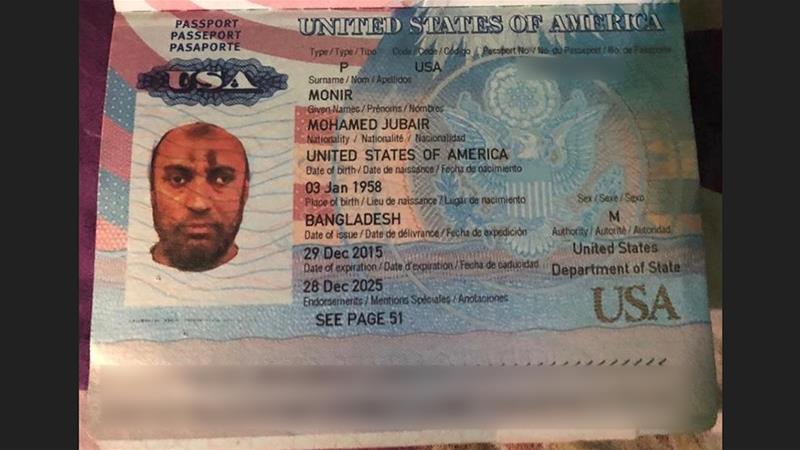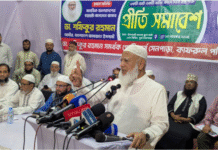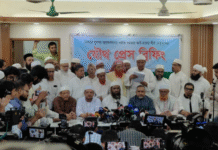US citizen of Bangladeshi origin arrested for 1971 ‘war crimes’
Mohamed Jubair Monir accused of murder and rape while family claims he was just 13 during the 1971 war of independence.

A United States citizen of Bangladeshi descent has been arrested in Bangladesh for allegedly committing war crimes, including “murder and rape”, during the country’s 1971 war of independence from Pakistan.
Mohamed Jubair Monir, 62, was arrested despite official documents purportedly showing he was only 13 when Bangladesh was liberated.
His family also claims he did not live in the country for most of the duration of the nine-month war.
Monir was picked up by the police on December 19 from his house in a village in Sunamganj district in north Bangladesh and is being held in Keraniganj jail on the outskirts of capital Dhaka.
 |
| Monir’s (on the right) family shared this picture, claiming it was taken in 1973 [David Bergman/Al Jazeera] |
His family said he was arrested on political grounds after meeting a leader from the opposition Bangladesh Nationalist Party (BNP) who contested the national elections held last month.
“Monir has been swept up in the hysteria of the recent Bangladeshi election, which has been widely condemned for their irregularities and human rights violations,” said Jason Emert, the family’s lawyer.
“[He] is innocent of the crimes and must be released immediately. His politically motivated arrest is an affront to the already tarnished democratic process in Bangladesh.”
War crimes tribunal
Monir will be tried by the International Crimes Tribunal (ICT), a national court established by Bangladesh in 2010 to prosecute those accused of war crimes in 1971.
Bangladesh was formed in 1971 following a war with Pakistan since the then East Pakistan, initially called East Bengal, believed power was concentrated in the West.
An estimated 300,000 to three million people were killed and some 200,000 women raped during the war, cases related to which are now being heard by the ICT.
But the tribunal has been widely criticised by rights groups for lack of due process and bias, with one calling for the trials to be “suspended” because of “well-founded fears about fundamental unfairness in the pre-trial and trial stages”.
The tribunal has convicted 75 men, sentencing 53 of them to death. Six of those death sentences have so far been carried out.
Prosecutor Zead-ul-Malum told Al Jazeera that Monir was accused of “killings, confinement, rape, arson, and looting” in the areas of Shala and Derai in Sunamganj during the 1971 war.
“He was a member of the Razakar Bahini,” he said, referring to the force established by the Pakistani military to fight those who supported the creation of an independent Bangladesh.
Malum denied the prosecutors were targeting people linked to the opposition political parties.
“When we prosecute, we are guided by law and due process,” he stated. “I will not prosecute anyone because of their politics. But those who committed crimes during 1971 will be prosecuted, whatever their political beliefs.”
Malum said the investigation was almost over. “We are verifying some of the materials we have collected.”
Monir’s daughter Srabon Monir told Al Jazeera her father was a small businessman who had been living in the US since 1982 and became a US citizen in 1991.
“He rents two stores in Brooklyn in New York, where he lives and owns two farms, but he also has some business interests in Bangladesh, including an office block, a rice mill and a fishery,” she said.
She said her father left New York on November 18, 2018 to travel to Bangladesh and was due to return on January 7.
“I received a call on December 18 from my uncle to say he had been arrested. I was shocked,” she said.
 |
| Official documents shared by Monir’s family show he was 13 in 1971 [David Bergman/Al Jazeera] |
‘He was 13 years old in 1971’
Srabon shared with Al Jazeera copies of her father’s birth certificate, his US naturalisation certificate and passport to show he was born on January 3, 1958 and had just turned 13 when the war started.
 |
| Monir has been a US citizen since 1991 [David Bergman/Al Jazeera] |
“How could he have committed war crimes when he was 13 years of age?” she asked.
Srabon also said for most of the nine-month war, her father was not living in East Pakistan [later Bangladesh], where the conflict took place.
“Since 1969, when he was 11, he had been living with his uncle in Lahore in [then West] Pakistan, going to school there, and did not return to Bangladesh until October 1971, two months before the war ended,” she said, though she did not have any evidence to back her claim.
On Monir’s age and location during the 1971 war, ICT prosecutor Malum said, “He may claim this. If they have any facts, his lawyer can come forward to the tribunal.”
Srabon acknowledged her grandfather, Abdul Khalique Monir, a well-known local politician in 1971, collaborated with the Pakistani military during the war and this could explain why the tribunal investigators arrested her father.
“I have been brought up with this story, that is also well-known in the area, that after the Pakistan military surrendered on December 16, 1971, pro-independence forces killed my grandfather along with 96 other men, all of whom had given themselves up,” she told Al Jazeera.
Malum said allegations of this kind should be given to the tribunal.
Meanwhile, the US consular authorities have not been allowed to meet Monir, who is expected to be brought before the ICT for the first time on January 20.
“Embassy officials should meet Monir as soon as possible and not allow the tribunal to hold him as a hostage,” his US lawyer Jason Emert said.
“They should demand the unconditional release of Monir, an American citizen, and see to it that he is able to return home to his family in the United States at once,” he added.
Monir was arrested 11 days before the Bangladesh national elections – widely considered to have been rigged – when opposition activists were routinely harassed by the police with many people arbitrarily arrested.











